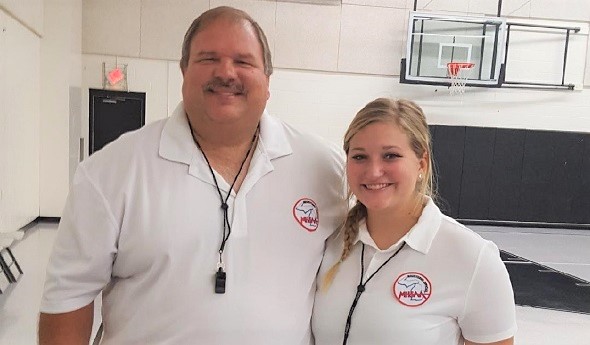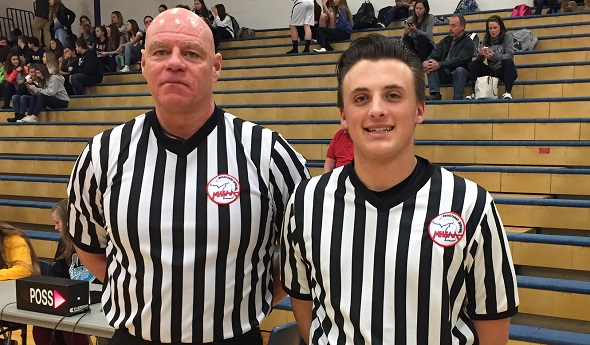
The Official View: It's In Our Blood
By
Brent Rice
MHSAA Assistant Director
September 10, 2019
Some have said that officiating has to be in your blood.
The avocation runs through the veins of nearly 10,000 officials in this state, and “The Official View” returns this week not only to inform those valuable contributors to school sports, but also to provide an inside look at some of the people wearing the stripes – including a daughter who has followed her dad onto the court.

It’s Official!
The MHSAA Officials Guidebook is the main source for rules and regulations and policies and procedures to which MHSAA Registered Officials are to adhere. For the first time in several years, the document has been updated and revised for clarification and the removal of redundancies. It also has a new look and format that will hopefully make it easier for officials to read and review. The updated Guidebook can be found by CLICKING HERE.
Officials Bulletins for the fall season have started. Check out your specific officials sports page for this and more. You can find documents, helpful links and sport-specific information. CLICK HERE.
Rule of the Week
VOLLEYBALL After the first set comes to a close, the coach approaches the officials’ table and removes the lineup sheet to prepare the lineup for the next set.
Ruling: This move is legal … between sets. However, the lineup sheet, along with the roster sheet, must remain at the officials’ table throughout each set.
It’s Your Call
FOOTBALL This week’s clip questions the legality of a block. In the video, No. 64 in white immediately at the snap cut blocks No. 54 in blue.
Is this a legal block? What’s the call?
Official View: A Family Tradition
Interested in getting a job before she headed off to college, Frankenmuth native Megan Jarlock noticed it was difficult to find one that fit around her busy schedule and that could give her the level of saving (or spending) money she sought.
She started officiating at the suggestion of her dad, Mark, who has served as an MHSAA official for nearly 20 years himself. Mark informed Megan she could make twice as much per hour officiating as she could working in traditional college-student jobs, and she could determine for herself what games she did and didn’t want to accept.
Besides the side cash and schedule convenience, officiating provides Megan additional benefits as well. Megan is able to remain around sports she loves, stay active and keep healthy and happy. She officiates volleyball in the fall and basketball in the winter, and has even done some softball in the spring. The most important thing, though, is that she gets to officiate with her dad.
“I am also very lucky to have my dad by my side to help me learn and grow as an official and a person,” says Megan.
One of the best parts of working with her dad is the car rides, where they have a chance to catch up on each other’s busy lives. And like a lot of mentor officials, Mark often takes his daughter out to dinner after the game to discuss things she did well and areas she can improve. She is grateful for the ability to share time with her dad, both doing what they love.
Of her dad and experience, Megan said, “He is a great sports official, but an even better father and role model. I’m really enjoying being an official, and these are the moments with my family that I will remember for the rest of my life.”
PHOTO: Megan Jarlock and her dad, Mark, prepare to work an MHSAA contest. (Photo provided by the Jarlock family.)

Grand Blanc Senior Joins Officials 'Legacy'
February 15, 2017
By Lisa Paine
Swartz Creek View
HARTLAND – Michigan, not unlike most other states across the nation, is struggling with a shortage of officials for junior high and high school sports. Steve Tannar, the Kensington Lakes Activities Association assigner, says locally that Michigan High School Athletic Association registered officials are down by one third.
Looking to stem the tide, the MHSAA is reaching out to high school juniors and seniors through its Legacy Officials Program.
Jason Caine, a Grand Blanc senior, is working with his veteran partner, Shawn Waterman. Caine said he came across the program through an online application and “just wanted to give it a try.”
“I attended a clinic at Goodrich High, just the basics, and it just took off after that,” said Caine. “After the clinic I attended Rules School and the Genesee County Officials Association (GCOA). Through that, I got partnered with Shawn Waterman (a veteran MHSAA official). They mentor us and show us the basics.”
Caine is also being mentored by eight-year MHSAA official and former coach Brian Morley of Grand Blanc. Caine, who played freshman and junior varsity baseball at Grand Blanc, said he’s not a typical multi-sport athlete.
“I’m a DECA Officer at Grand Blanc,” explained Caine. “It’s a business club that presents their businesses to potential investors. Officiating is a side hobby that I want to pursue. Next year I plan on attending college and with officiating, I can take that with me wherever I go.”
Tannar said the ultimate goal of the Legacy program is to get the word out to recruit more teens like Caine.
“The main reason we are looking to grow our officials program is because we have such an officiating shortage all over the country,” said Tannar. “Not many of us are under the age of 40. The average age of our officials is mid to upper 50s. If we don’t recruit and get them working now, we’re going to be faced with a shortage of officials.”
“It really began when they switched girls basketball (to winter) and everyone tries to play triple headers on Tuesday and Friday,” explained Tannar. “I need 42 officials in one night to fill the six schools I assign for the KLAA.”
Tannar noted that in 2012 the GCOA qualified 125 officials to work in MHSAA tournaments. This year that number dropped to 84.
“Mentoring the rookie officials such as Caine is a big responsibility," said Morley, who is one of three officiating trainers in the area. He’s been officiating in the Saginaw Valley League, Flint Metro League, Genesee Area Conference and KLAA.
“This year we were in an ad for the MHSAA, and Jason was one that responded. He was looking for something other than working at McDonald’s. I told him the MHSAA has a program in place to train officials,” said Morley, who found his own path to the MHSAA officials program as an adult.
Morley also spoke to the number of officials needed.
“We figured for the Saginaw Valley plus the Thumb area and into where Steve is (KLAA), somewhere between 300 and 400 officials are needed on a given Tuesday or Friday,” Morley said.
 Officiating isn’t easy, as it’s about more than just calling the games, noted Tannar.
Officiating isn’t easy, as it’s about more than just calling the games, noted Tannar.
“The number one reason for quitting officiating is the fans and their reactions, not the coaches or players,” Tannar said.
Mark Uyl, assistant director for the MHSAA and its coordinator for officials, echoed that. He’s seen the profession take its hits over the past five years.
“The biggest challenge in officiating is it’s a thankless job,” Uyl said. “We are expected to be perfect on our first day. But you can’t play without officials, so our culture needs to rethink how we are acting as fans in the athletic arena. We are in an angrier society right now and until that trend reverses itself, we face that challenge.”
“So much of officiating is handling people, managing emotions. If we can keep getting people of all ages interested in our officiating program, we can continue to put quality officials at all levels of games – youth sports, junior high through high school and into the college games,” Uyl said.
The fans were one of Caine’s first concerns.
“It was a little nervy at first, but when I got up there, Shawn was a great partner and assured me everything was OK no matter what the outcome,” said Caine. “My background at the clinics and Rules School gave me the confidence.”
Morley explained the importance of teaming up rookies with veterans.
“That’s why this training is so important. If Jason and these others didn’t have us to learn from, lean on, fans can be brutal. Part of our training is how to combat or ignore the angry fans and block that out and do what we need to do in these games. Our job is protect our rookies in their first couple of years to help everyone handle the heat of the moment. We can’t lose someone because of the ugliness that often goes on around us,” said Morley.
The money isn’t bad either. Morley and Uyl said refs can pick up anywhere from $35 to $65 on any given night.
"Many don’t realize how good the money is in officiating,” said Uyl. “After school jobs are $9-10 dollars an hour. (Officiating), they can make $35 in one game.
Tannar said the plan is to turn up recruiting another couple of notches into the next year.
“Next year we want to get into the schools and do a presentation to an all-level program at every school. If I can get one or two kids, that gets us 40 new officials.”
Uyl is grandfathering in Legacy Official students for free, saving them money on the typical registration fees.
More clinics are planned for the Legacy Officials program in the spring and fall of 2017.
This story originally appeared in the Dec. 29, 2016, edition of the Swartz Creek View and is reprinted with permission.
PHOTOS: (Top) Veteran official Shawn Waterman (left) stands with Grand Blanc senior Jason Caine during Caine's first game as an MHSAA referee Nov. 30. (Middle) Caine monitors the action during the junior high game in Hartland. (Photos courtesy of Steve Tannar.)

